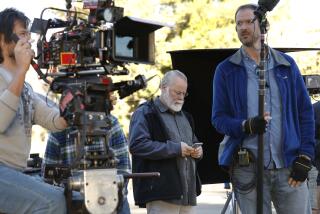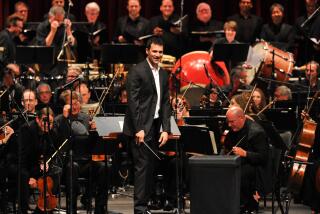Who gets left out of all those Hollywood tax incentives? Musicians
Most of Hollywood celebrated in September, when California Gov. Jerry Brown put his signature to a vastly expanded tax incentive for the movie industry.
Musicians were left out of the party. Brown’s signature more than tripled the program’s size to $330 million from $100 million starting in 2016, extended it through 2020, and expanded the types of productions that qualify. But the measure will do nothing to stem the rapid outflow of music scoring from California to Britain and other foreign countries.
We last addressed the crisis for musicians last year, when we pointed out that producing incentives such as California’s were effectively subsidizing employment overseas, because they lacked a requirement that scoring for subsidized productions be done in the U.S.
A report published today by the Los Angeles Alliance for a New Economy, or LAANE, provides more ammunition. The report points an especially sharp finger at Lionsgate, Hollywood’s newest “major” studio, which LAANE says has done almost nothing to preserve musician jobs in California. We asked Lionsgate to comment, and will update this post if and when it does.
Sacramento hasn’t helped; discussion of the plight of film music was virtually nonexistent when the expansion of the film tax credit was debated this year, says Jon Zerolnick, LAANE’s research director and the report’s lead author. “Our goal is to shine a light on a discussion that never happened,” Zerolnick told me.
As LAANE reports, total session wages for musicians in Los Angeles have fallen by more than two-thirds over the last 15 years, to $15.5 million from $50 million. Technology has much to do with the decline, as synthesizers allow composers to replicate--if imperfectly--the sound of a live ensemble and make even live work less time-consuming. Fashion also has played a role, as producers replaced composed scores with pop music, in search of an up-to-date aesthetic.
But penny-pinching and Hollywood’s economic structure are a major factor in the decline. Musicians in new recording meccas such as Eastern Europe are much cheaper than union talent in Los Angeles; their quality is lower, too, but perhaps not by enough to be detected by the average moviegoer’s ear.
Technology allows composers and music directors to conduct a recording session remotely. LAANE reports that music for the Lionsgate feature “Draft Day,” which received a $4.9-million tax credit to shoot in Ohio, was “recorded in Macedonia while composer John Debney remained in Los Angeles.”
Then there’s the rise of the “package deal,” in which a composer gets a single fee to deliver a recorded score to a film or TV program’s producers--composing, hiring musicians and recording all wrapped together. That gives the composer a financial incentive to find the cheapest capable musicians wherever they are; if the production company isn’t a signatory to a contract with the American Federation of Musicians, union labor isn’t required. LAANE estimates that more than 65% of all film scoring and 95% of all TV work is now subject to package deals.
Finally, there’s the studio system. The majors--21st Century Fox, Disney, Sony, TimeWarner, NBCUniversal, and Viacom, are AFM signatories. But the contracts often don’t apply to their subsidiaries or speciality production units. The newest major, Lionsgate, doesn’t have an AFM contract.
The irony is that music is often a minimal expense on a production’s spreadsheet--if Lionsgate spent the normal share of the $130-million “Hunger Games: Catching Fire” on music, say, the bill would come to less than $600,000.
But the effect on Southern California of runaway scoring is huge. LAANE estimates that if music post-production were returned merely to the 2000 level, that would create a $37.5-million shot in the arm for the local economy. It would keep thousands more musicians employed and shore up a declining artistic infrastructure.
That underscores the flaws in the California subsidy. Because it’s aimed mostly at counteracting the production credits provided to Hollywood by other states, its drafters haven’t done much to focus on which segments of the production and post-production industry need the most help. The expanded program enacted this year does provide a tax break for spending on music scored in California, but it doesn’t require a minimum level of scoring and recording in the state before the subsidy kicks in.
Sacramento isn’t entirely insensitive to the needs of post-production workers; the program does set a standard for visual effects subsidies: to qualify for enhanced subsidies, at least 75%, or $10 million of the visual effects spending, must be in California. There’s no such requirement for music scoring, and there should be. Movies and TV would be better for it, and some of our most valued professionals would too.
Keep up to date with the Economy Hub. Follow @hiltzikm on Twitter, see our Facebook page, or email mhiltzik@latimes.com.







